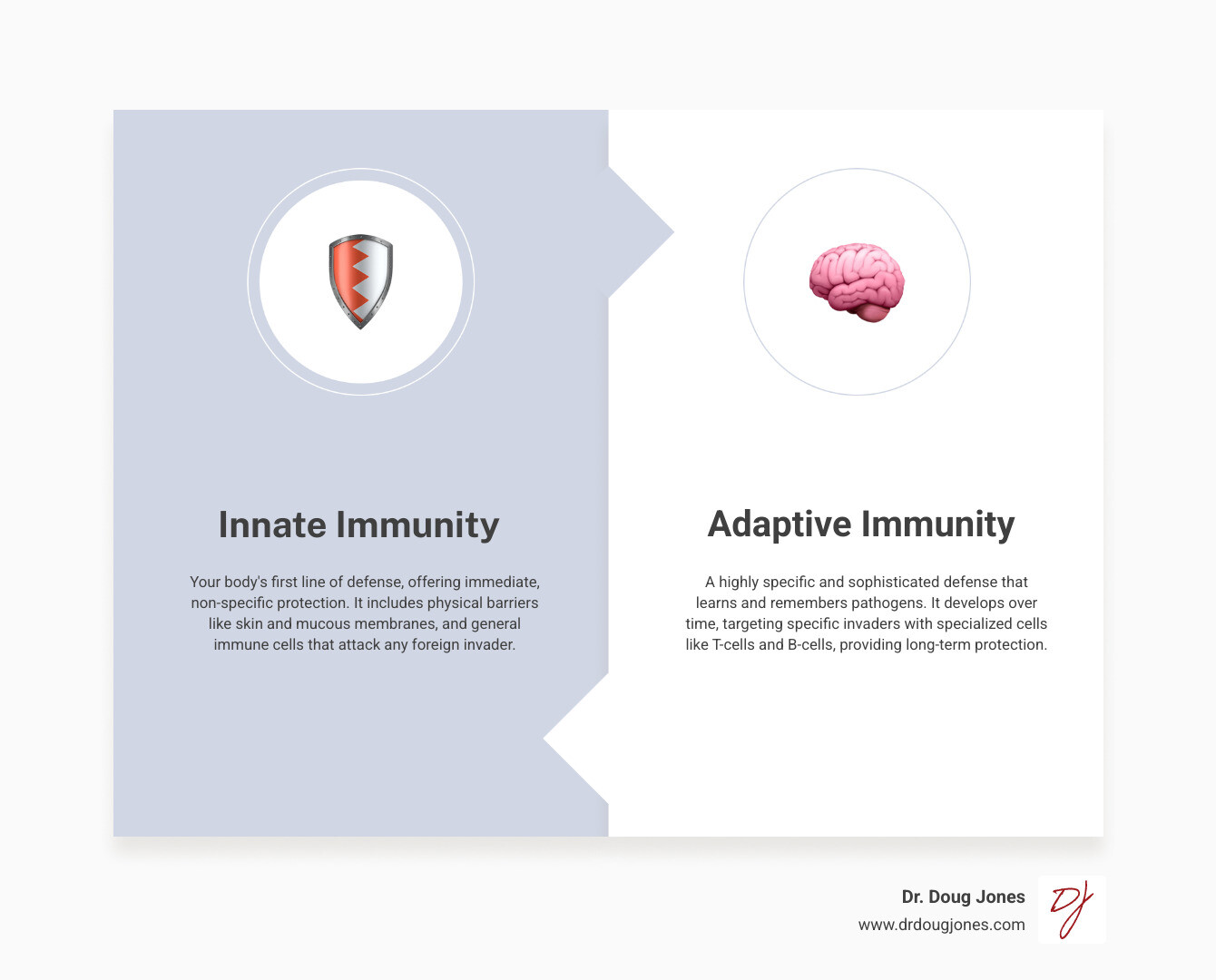Why Your Immune System Needs More Than Just Detox Trends
Immune system strengthening or boosting is a hot topic, but the concept is not scientific. It is marketing and many "detox" products on social media miss the point. Your immune system doesn't need a "detox"; it needs consistent support through proven, science-based methods.
Quick Answer for Immune System Optimizing:
- Sleep 7-9 hours nightly - Your body produces infection-fighting cytokines during sleep
- Eat colorful whole foods - Fruits, vegetables, and lean proteins provide essential nutrients
- Exercise moderately - 30-60 minutes several days per week boosts immune cell circulation
- Manage chronic stress - High cortisol levels suppress immune function
- Practice good hygiene - Hand washing prevents pathogen entry
- Stay up-to-date on vaccinations - They train your adaptive immune system
- Limit alcohol and avoid smoking - Both weaken your body's defenses
Your immune system is an incredibly sophisticated network that requires balance, not a simple "boost." Instead of falling for expensive trends, focus on consistent habits that support your body's natural defenses.
Chronic food allergies, long COVID, and persistent immune challenges require a different approach. These conditions often involve immune system imbalances that need targeted, personalized care - not generic wellness trends.
I'm Dr. Doug Jones, a board-certified immunologist who has spent over a decade helping patients with complex immune conditions find lasting relief through evidence-based treatments. My approach to immune system strengthening focuses on addressing root causes rather than chasing quick fixes, especially for those dealing with food allergies, mast cell activation, and post-viral syndromes.

Understanding Your Immune System: The Body's Intelligent Defense
To achieve immune system optimization you must first understand how your body's defense network works. It's a highly coordinated team of organs, cells, and proteins that constantly protects you from harmful invaders.

Your immune system has two main divisions that work together like a well-orchestrated team:
Innate immunity is your body's first responder system. Your skin acts as a physical barrier, while cilia in your airways sweep out particles. If something gets through, specialized cells called phagocytes rush to the scene and consume the invaders.
Adaptive immunity is your body's specialized force that gets smarter over time. This system learns and remembers every threat. The star players are lymphocytes—specifically T-cells and B-cells. B-cells create custom antibodies for each threat, while T-cells directly kill infected cells and coordinate the overall immune response.
Crucially, your immune system can distinguish "self" from "non-self," preventing it from attacking your own healthy tissues—a process that goes wrong in autoimmune conditions.
Immune balance is everything. An underactive system leads to frequent infections, while an overactive one can cause allergies and autoimmune diseases. Research indicates that a balanced immune system is crucial for optimal health.
How do you know if your immune system is struggling? Your body sends clear signals. Obvious red flags include frequent infections (like recurring colds or sinus issues) and slow-healing wounds. Other warning signs are chronic fatigue, persistent digestive problems, and frequent skin infections. These symptoms indicate it's time to support your body's defenses.
Understanding how your immune system works is the first step toward immune system strengthening. Once you grasp this system's complexity, you'll see why quick fixes can't compare to consistent, science-based support.
Foundational Lifestyle Habits for Immune System Strengthening
Immune system optimization isn't about quick fixes; it's about building consistent daily habits. Your immune system flourishes when built on four foundational pillars that transform your body's natural defenses.

Prioritize Quality Sleep
Quality sleep is a non-negotiable prescription for immune system optimization. While you rest, your immune system is hard at work producing protective proteins called cytokines.
Your immune system has an internal clock synchronized with your circadian rhythm. During 7-9 hours of quality sleep, your body ramps up production of infection-fighting cells.
Skimping on sleep weakens your defenses. Research analyzing sleep-deprived adults found a higher likelihood of catching a cold, with a four-fold increased risk for those sleeping less than six hours. Sleep deprivation slashes cytokine production and can reduce immune cell activity by up to 70% after just one poor night.
Aim for 7-9 hours nightly. Support deep sleep by putting away screens an hour before bed and keeping your bedroom cool and dark.
Manage Chronic Stress
Chronic stress is a silent saboteur of immune health. When stress becomes chronic, it floods your system with cortisol. This stress hormone, helpful in emergencies, creates widespread inflammation and suppresses your immune response when it's constantly liftd.
Studies prove that chronic stress can suppress protective immune responses. It interferes with white blood cells' ability to fight infections and can reduce the production of lymphocytes.
Managing stress isn't about eliminating it, but about building resilience and recovery practices into your daily routine. Simple techniques like meditation, yoga, or journaling can make a profound difference by helping to reset your nervous system. Find what works for you and make it a routine.
Move Your Body Mindfully
Do what you can and build on it, consistently. Start wherever you are. If it is a slow walk or a brisk walking or swimming, helps your immune cells circulate more effectively. The National Library of Medicine states physical activity can help keep pathogens out of your lungs. Regular movement also reduces inflammation and helps immune cells regenerate.
The sweet spot is 30-60 minutes of moderate activity several days per week. Consistency is more important than intensity.
However, more isn't always better. Overtraining can temporarily weaken your immune system, making you more susceptible to infections. Listen to your body and find a balance where exercise energizes rather than exhausts you.
Practice Smart Hygiene
Simple hygiene practices are a powerful first line of defense, preventing pathogens from entering your body.
Handwashing is one of the most effective tools. The CDC specifically recommends washing your hands with soap and water for at least 20 seconds. When soap and water aren't available, a hand sanitizer with at least 60% alcohol is a good backup.
Beyond handwashing, avoid touching your face—especially your eyes, nose, and mouth—to prevent germs from finding easy entry points. These simple practices work with your internal defenses to create multiple layers of protection.
Fueling Your Defenses: The Role of Diet and Nutrition
What you eat directly impacts your ability to fight illness, making nutrition a cornerstone of immune system strengthening.

Eat a Rainbow of Whole Plant Foods
A simple rule for a stronger immune system is to "eat the rainbow." The vibrant colors in fruits and vegetables are key. These foods are packed with antioxidants, which protect your cells from damage and inflammation that can weaken your immune system.
These plant foods are also rich in fiber, which feeds your gut microbiome. With about 70% of your immune system residing in your gut, a healthy microbiome is essential for helping your body distinguish between friend and foe.
The U.S. Dietary Guidelines suggest aiming for two cups of fruit and 2.5 cups of vegetables daily. Immune-supporting superstars include citrus fruits, berries, leafy greens, bell peppers, sweet potatoes, garlic, and ginger. Also, try to limit added sugars and refined carbs, which can fuel inflammation.
Incorporate Key Immune-Supporting Nutrients
While a varied diet is key, certain nutrients are heavy hitters for immune system optimization:
Vitamin C is a powerful antioxidant. Research shows that adequate vitamin C, especially with zinc, can help reduce respiratory infection symptoms and duration. Studies display that getting enough vitamin C and zinc may help reduce respiratory infection symptoms. Find it in citrus fruits, bell peppers, and strawberries.
Vitamin D is crucial for immune balance. Studies show people with lower vitamin D levels get sick more often. Good sources include fatty fish like salmon, mushrooms, and fortified dairy.
Zinc coordinates the action of many immune cells and can interfere with processes that allow bacteria to build up. Find it in meat, shellfish, legumes, and nuts.
Beta-carotene, found in carrots, sweet potatoes, and bell peppers, is converted to vitamin A and is a powerful inflammation fighter.
Healthy fats and omega-3s act as natural anti-inflammatories. Olive oil is linked to reduced chronic disease risk, while omega-3s from fatty fish and chia seeds actively fight inflammation.
The Truth About Supplements for Immune System Optimization
Supplements promise to "boost" immunity, but they aren't magic bullets and can't replace a balanced diet. The FDA doesn't regulate supplements like medications, so quality varies. If you supplement, look for brands with third-party testing from USP or NSF International.
Probiotics from yogurt and kefir add helpful bacteria. Prebiotics—fibers in garlic and bananas—feed them. Postbiotics—compounds they produce—support gut barrier function, aiding immune balance and lowering infection risk.
Elderberry has gained popularity, and some research is promising. A review found that elderberry could reduce the symptoms of viral upper respiratory infections, but more studies are needed.
Other options like echinacea, ginseng, ginger, and green tea may offer supportive benefits, but more research is often needed.
The bottom line: no supplement can replace a comprehensive approach. Think of them as potential supporting actors, not the star of the show. The National Institutes of Health reminds us that no supplement has been proven to prevent or treat major illnesses like COVID-19. Focus on the fundamentals first.
Navigating Special Considerations for a Resilient Immune System
Immune system optimization isn't one-size-fits-all. I like to think of this as "finding the size that fits the one." Your needs shift with age and life circumstances, so understanding these changes is key to supporting your defenses.
The Importance of Vaccinations for Immune System Strengthening
Vaccinations are like a practice run for your immune system. They introduce your adaptive immune system to a pathogen's "wanted poster" without causing illness. This creates immune memory, so if you encounter the real threat, your body can launch a swift response.
Vaccinations protect you against serious illnesses like flu, COVID-19, and tetanus. They have safely prevented millions of deaths worldwide. Beyond personal protection, vaccinations contribute to herd immunity, creating a protective shield around those who cannot be vaccinated for medical reasons.
Bonus: a single session of moderate exercise can even boost vaccine effectiveness. Staying current with recommended vaccinations is a proactive step for immune system strengthening.
Supporting Immunity Through Different Life Stages
Your immune system ages with you in a process called immunosenescence. As we get older, our immune response becomes less robust, increasing susceptibility to infections. This is partly due to the thymus gland shrinking and potential micronutrient deficiencies (zinc, selenium, vitamins A, C, E, etc.).
The good news is that you're not powerless. Physical activity can help counter many effects of immunosenescence. A study highlights that physical activity can help counter some effects of immunosenescence. Research shows active older adults have significantly better immune function than their sedentary peers.
While vaccines may be slightly less effective in people over 65, they still dramatically reduce serious illness and death. A nutrient-rich diet becomes even more important with age. The key is to adapt your approach to immune system strengthening as your body changes.
Healthy vs. Sick: Adjusting Your Immune Support Strategy
Your immune support strategy should shift depending on whether you're preventing illness or fighting it. When healthy, you build reserves; when sick, you support the battle.
When illness strikes, rest is non-negotiable. Your body needs energy to fight infection. Hydration is also critical to help flush out pathogens. Aim for pale yellow urine, focusing on water over sugary drinks.
Choose nutrient-dense, easy-to-digest foods like broths and soups, even if your appetite is low.
Symptoms like fever and inflammation are often part of your body's defense strategy. A fever slows pathogen growth, while inflammation brings immune resources to the infection site. The goal of immune system optimization is always to support your body's natural ability to protect and heal itself.
Frequently Asked Questions about Immune Health
As an immunologist, I repeatedly hear the same questions about immune system optimization. Here are straightforward, science-based answers to the most common concerns.
What are the first signs of a weak immune system?
Your body signals when its defenses need attention. The most telling sign is frequent colds (more than two or three per year for an adult).
Recurring infections are another red flag, such as repeated ear infections, sinus problems, or bronchitis. Your body should be able to fight these off more effectively.
Since about 70% of your immune system is in your gut, digestive issues like persistent diarrhea or constipation can signal an immune imbalance.
Chronic fatigue that doesn't improve with sleep often indicates your immune system is working overtime. Similarly, slow wound healing suggests your immune response isn't functioning optimally.
Finally, frequent skin infections can also point to deeper immune issues.
Can you actually "boost" your immune system overnight?
The idea of "boosting" your immune system overnight is marketing hype, not medical reality. The immune system isn't a volume dial you can simply turn up. An overactive immune system can cause problems like autoimmune conditions.
Real immune support comes from consistent healthy habits over weeks and months, not a quick fix. This is what builds lasting immune resilience. The goal is to support and balance your immune function through proven lifestyle strategies.
Are supplements necessary for a strong immune system?
For most healthy people with a well-rounded diet, supplements aren't necessary for immune system optimization. Food should be your primary source of nutrients.
However, supplements can fill specific gaps. If you have known nutrient deficiencies, dietary restrictions, or increased needs due to health conditions, targeted supplementation can be helpful. Vitamin D deficiency, for example, is very common and one area where supplementation often makes sense.
Taking random supplements without understanding your specific needs is rarely helpful and can be harmful, as high doses can cause side effects or interfere with nutrient absorption.
Consult with a healthcare professional before starting any supplement regimen. They can evaluate your unique situation and recommend safe dosages. This personalized approach is crucial for those with complex immune challenges like food allergies, mast cell activation, or post-viral syndromes. Supplements are meant to supplement a healthy lifestyle, not replace it.
Conclusion
The path to immune system optimization isn't in flashy marketing but in the quiet, consistent choices you make daily: prioritizing sleep, eating colorful vegetables, and taking a walk to clear your mind.
Your immune system doesn't need to be "boosted" or "detoxed." It needs your support and commitment to the basics that help it function optimally.
We've covered the science: how your immune system works, why sleep and stress management are critical, and how diet, exercise, and hygiene form your defense. Whole foods beat processed ones, moderate exercise strengthens, and good hygiene is a powerful tool.
There's no one-size-fits-all approach to immune health. Your needs change throughout life, which is why personalized care matters, especially for complex conditions.
For many, following these foundational principles is enough. But if you're struggling with chronic food allergies, persistent symptoms after COVID-19, or other complex immune challenges that haven't responded to standard approaches, you may need a deeper dive into what's happening in your body.
These conditions often involve immune system imbalances that require targeted, individualized attention—not generic wellness advice.
Your immune system deserves your respect, patience, and evidence-based care. Whether you're maintaining good health or seeking answers to complex immune challenges, the journey starts with understanding your body's remarkable capabilities and giving it what it truly needs to thrive.






.png)